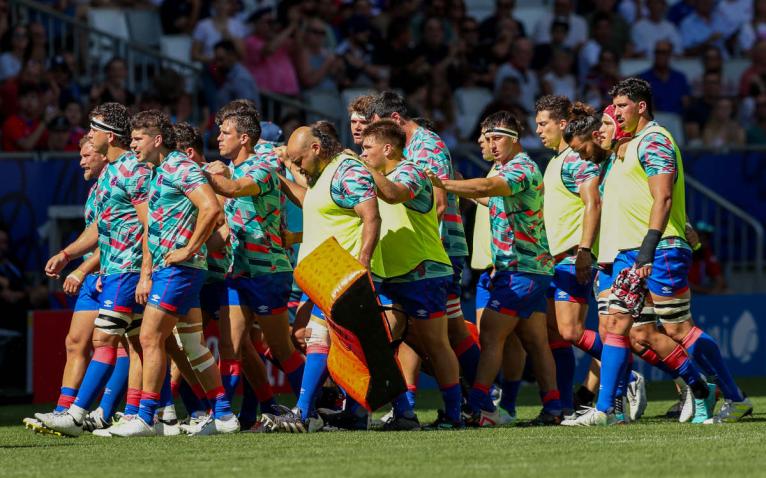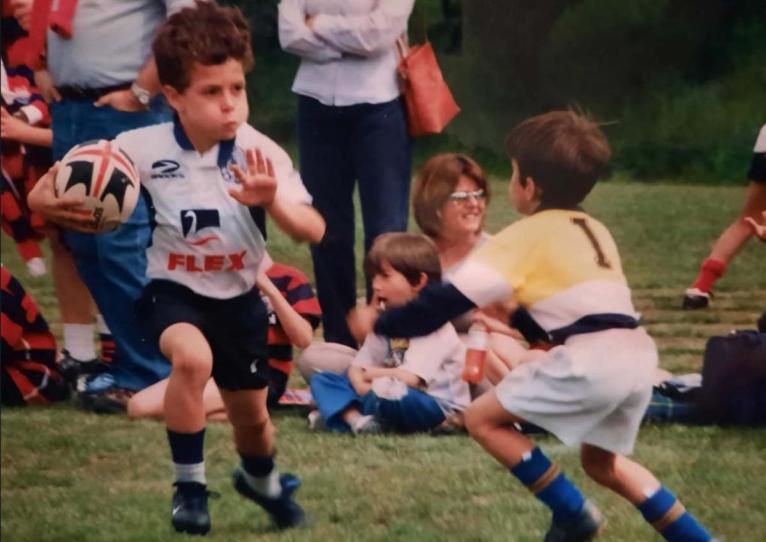In a dizzying mass of flailing limbs and red shirts, one fan stands out. High up in the Stade de Bordeaux, he’s leaning towards the pitch down below. Both his arms are thrust out in front of him. His fists are clenched and pulsating to the beat of the crowd’s chants.
His name is Diego Sigren. His handlebar moustache is coloured in the red, white and blue of the Chilean flag. An amateur rugby player himself, the 33-year-old earns a living as a guitarist in both a jazz and a funk band in Santiago. He’s come a long way to watch his countrymen play in their first Rugby World Cup. Well, one countryman in particular. His brother, Martin, is the captain of the side.
Before their match against Samoa, Diego said he “couldn’t put into words” what it meant to watch his little brother lead his nation. To watch him sing the national anthem. To put his body on the line for 19.5 million Chileans and play a key role in catapulting a fringe sport in the country onto a global stage.

A few days later, Diego is full of words. And, whenever he’s not, he has a little help. You see, Martin and Diego are two of five Sigren brothers. There’s Manuel Jose, 30, who is an environmental engineer who up-cycles used fishing nets. Juan Pablo, 32, has pursued a career in business despite being credited as being the most naturally athletic of the bunch. The baby of the group is 21-year-old Antonio, who is completing a degree in journalism.
Like Martin, all of them are flankers, just like their father, Raul, who won two caps for Chile back in the 1980s. Their sporting prowess also comes from their mother, Sol Molina, who excelled on the tennis court and “could have gone pro”, according to Diego, “if only she never had me.”
With Martin gearing up for his next match against England in the 1980s, the remaining Sigrens squeezed into the frame of a video call with Rugbypass Plus.
___
RP: First of all, Sol, how on earth did you feed all of these growing boys?
Sol: I don’t know! It was very difficult. A lot of spaghetti. I’m a pretty good cook.
RP: Were they competitive against each other growing up?
Sol: No, not with each other. They were competitive against other boys. But together they’ve always been amazingly friendly. They’ve always looked out for each other.
RP: How did you keep them all straight? They’re all rugby players, all flankers, it must have been chaos in your home?
Sol: Every day of my life is chaos. That was today. Just getting them from the hotel, to the ground, to breakfast. It’s always been like that.
Juan Pablo: There were a lot of broken bones.
RP: What was the worst injury of the lot?
Manuel Jose: Mine for sure. I broke my jaw twice on the rugby field. I got my head in the wrong position in the tackle. A knee smashed me in the face. And I hated to use a mouth guard.
RP: Who was the second best Sigren brother on the field? Who had the best chance of making it to the national side?
It’s unanimous. They all single out Juan Pablo immediately.
Juan Pablo: I played for ten years. But I had eight general surgeries. Both of my knees, my elbow, my nose. In the end, I decided to end it. Because I love playing other sports. I play a lot of tennis and football. And all the injuries forced me to stop playing those other sports. So when Covid came I decided to stop playing rugby.
At this point Raul joins to conversation, taking up a central position with his boys flanked out on either side.

RP: Raul, you represented Chile. Can you tell me about your rugby career?
Raul: I played from 1982 to 1985. I also played flanker.
RP: Do you feel like you, and the rest of your family, carry a sense of duty? You’re practically Chilean rugby royalty.
Raul: Absolutely. Martin is the third generation to play this game. It started with my father [also named Raul] and my father-in-law [Sergio Molina] who played in the ‘40s. I first started playing in 1966 and stopped playing in 1996. Now having my five sons playing rugby and loving the game, it’s a special thing.
Rugby is part of our tradition. We all went to the same school, The Grange School. My father and father-in-law too. It’s a big British tradition there. And as a matter of fact, the Grange has 10 players in the Chilean team. That has to be some sort of record. It’s basically two schools, the Grange and Craighouse, that lead Chilean rugby.
So it is a tradition in the family. We feel a lot of responsibility to be in France for the first World Cup. Hopefully the first of many. And we feel a responsibility to spread the game around the country. We don’t want it to just be an elite game. It is now pretty much spread from Arica, which is way north, all the way down to Punta Arenas.
Today we managed to get inside the government so that the public schools will get to play it.
Juan Pablo: On the statement of us being rugby royalty, I disagree with that. Because there are families that have two or three brothers playing at the highest level. Martin is the royalty. We can’t say we are. There are five families with two brothers in this team. They are the royalties.
RP: But Martin is leading them all. You must be immensely proud.
Antonio: It’s emotional every time we see him enter the pitch. It’s just so intense, it’s unbelievable. Every time it feels like I’m dreaming. It’s really unique. I can’t even describe the feeling.
Raul: It is like a dream coming true. When we were playing, the World Cup wasn’t even a distant dream. It was just way beyond any dreams we had. Four years ago we started a process by bringing in Pablo Lemoine as head coach. Then we started seeing the light at the end of the tunnel. He gave them a professional focus. All the families were brought on for the ride.

Manuel Jose: It also helped that we had a professional club [Selknam] coincide with the arrival of Pablo. So young people could see rugby as a career. That opened up a lot of opportunities.
RP: Tell me about your childhood. What was it like playing together as children?
Juan Pablo: We were always together. We’d divide into two teams and go until we couldn’t.
Diego: Our parents pushed us as a group. They showed us how to support each other. We’ve always been in the outdoors, exploring nature, hiking. Our parents are both athletes. My mother is a great tennis player.
Raul: We always took a rugby ball. On the beach, when we went outdoors, wherever.
RP: Would it ever get heated?
Sol: Yes, obviously. More than a few times. But that’s natural. They always explored the limits. They would climb trees, put themselves in some danger. Diego was like the ringleader.
Diego: And not always good ideas. We’re a family who loves the adrenalin rush.
RP: And what about Martin? Was he a leader?
Diego: Yes that was something he always had. He would always lead his friends. The other guys in his group looked up to him. But in our family he’s the fourth boy. There was a clear chain of command. There was a hierarchy that he respected. So even if we wanted to be a leader in the family we wouldn’t let him.
Antonio: He is a pacifier. He is very calm. He thinks through things more than the rest of us in the family. He never thinks he is more important. He is always humble.

Sol: Discipline is important to our family. Sports is key to that. If they wanted to go out partying they could. They could have a good time. But they had to focus on sports in the morning. They knew what was important.
We love skiing. Martin could have been a professional skier. He had to make a choice when he was 14. Rugby or skiing. Because it was the same season he couldn’t do both. He did alpine skiing. He had more discipline than any of us. That’s why he has succeeded in his sport.
But it wasn’t always easy. We’re a very tight family and travel together, we go on holidays together. But sometimes Martin hasn’t been able to join. Every summer we go to the lake and he couldn’t come. It’s good and bad. We’ve missed him at times.
Manuel Jose: Growing up we basically didn’t have to have other friends. We had all we needed. But of course we had other friends. We were just always closer to each other.
RP: Do you mingle with the other families that have players in the team?
Juan Pablo: Of course. We party together all the time. We’re travelling together now.
RP: Finally, is there anything that stands out from Martin’s childhood that made you think he’d one day be captain of the national team?
Sol: One day when he was small, the teachers came to him and asked him to tell the other children to behave. He didn’t want to do it. He said, “Why must I be that person?” But it was natural. Sometimes he can get frustrated because he didn’t want to be the good one. He wanted to be part of the bad group. But all the teachers were looking at him.
Raul: Back in high school he was forced to be the positive leader but he had this drive to be the negative leader. At the end of school he went out with friends and threw water bombs at other kids. Actually they caught him and took away the famous shield that is awarded for every captain at the school. So he’s the only captain in our famous school that left without his name on the cup. Because they caught him two weeks before school ended. So he had that taken away from him.
We reach the end of our conversation. The Sigrens are all eager to catch the start of the game between Uruguay and Italy. Diego explains that the whole of South America – the three participating nations from the continent, at least – are united together.
I believe him. Between our interview and the publication of this piece Diego has shared a stream of family images. There’s one of Manuel surfing a gigantic wave as the swell crashes behind him. There’s Antonio snowboarding in one shot and playing the drums in another. Diego shares two of himself shredding on his electric guitar.
The notion of brotherhood can be overplayed in rugby so it’s genuinely uplifting to come across a story that truly espouses this idealistic vision of the sport. Raul and Sol have been espousing its message for a long time. Other photos shared are of Raul playing an exhibition match against a group of Uruguayans. The same Uruguayans who survived the Flight 571 crash in the Andes that resulted in 29 deaths and was memorialised in the 2007 film, Stranded.
This is a family that bleeds rugby. That has given one of its sons to the sport. Keep an eye out for them for the remainder of the tournament. Even in the mass of flailing limbs and red shirts, they’ll stand out.


Comments
Join free and tell us what you really think!
Sign up for free